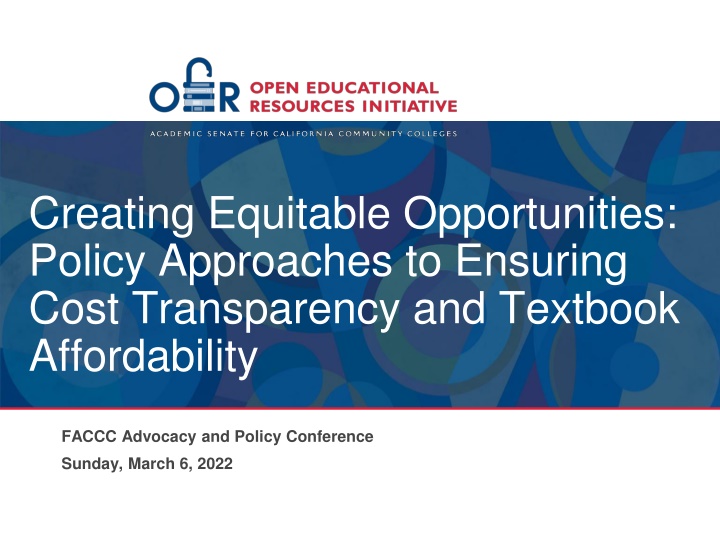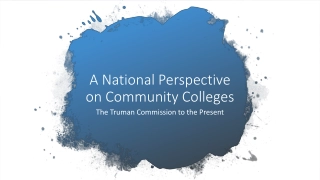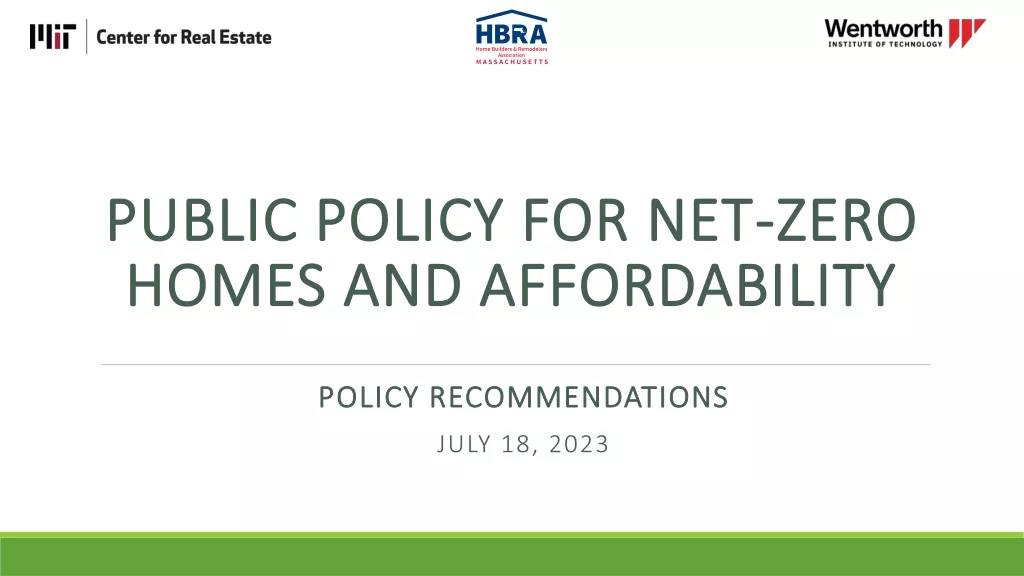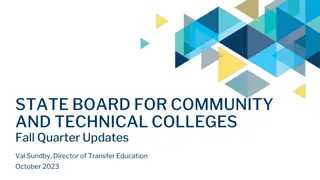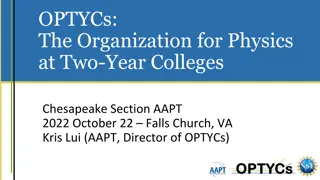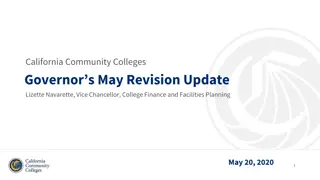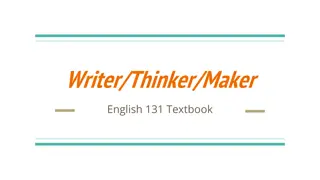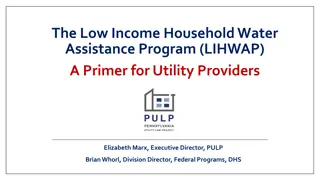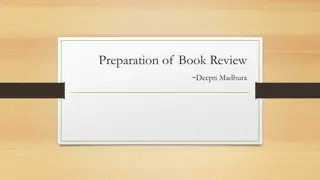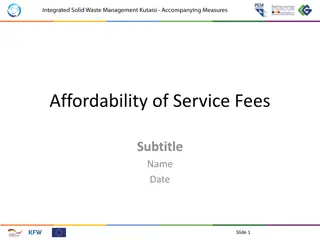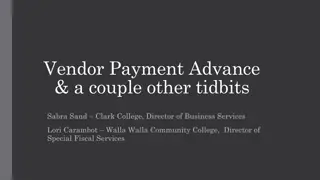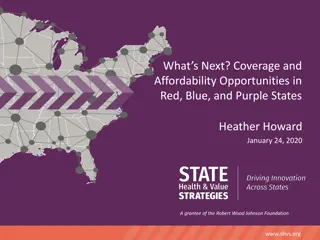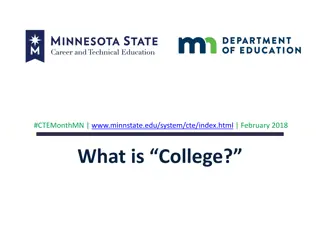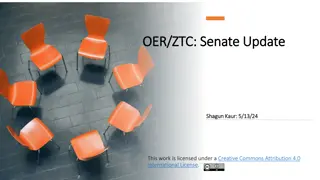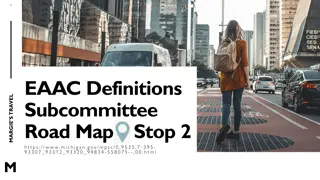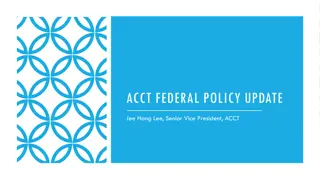Promoting Textbook Affordability in Community Colleges
Explore existing policies and regulations aimed at promoting textbook affordability and transparency in community colleges. Learn about the initiatives, investments, and considerations necessary to ensure cost-effective access to course materials for students. Gain insights from expert presenters and discover the impact of local requirements on faculty in selecting instructional materials.
Download Presentation

Please find below an Image/Link to download the presentation.
The content on the website is provided AS IS for your information and personal use only. It may not be sold, licensed, or shared on other websites without obtaining consent from the author.If you encounter any issues during the download, it is possible that the publisher has removed the file from their server.
You are allowed to download the files provided on this website for personal or commercial use, subject to the condition that they are used lawfully. All files are the property of their respective owners.
The content on the website is provided AS IS for your information and personal use only. It may not be sold, licensed, or shared on other websites without obtaining consent from the author.
E N D
Presentation Transcript
Creating Equitable Opportunities: Policy Approaches to Ensuring Cost Transparency and Textbook Affordability FACCC Advocacy and Policy Conference Sunday, March 6, 2022
Description While the basic cost of attending a CCC is not a barrier to pursuing an education, the costs of living in California and of purchasing required course materials can impede a student s progress as basic needs may be prioritized over the purchase of textbooks, access codes, and other educational expenses. What local policies, regulations, legislation, and federal requirements exist to promote textbook affordability and ensure cost transparency? Following a review of existing requirements, including funding to address textbook costs, the effectiveness of these requirements and future policy directions will be discussed.
Presenters Julie Bruno, Communications Lead, ASCCC OERI Virginia "Ginni" May, Vice President, ASCCC Michelle Pilati, Faculty Coordinator, ASCCC OERI
Overview Existing requirements related to textbook affordability and cost transparency $115 million investment Draft bills What do we need?
Existing Requirements Are there local policies, regulations, legislation, and/or federal requirements that aim to promote textbook affordability and ensure cost transparency?
Considering Costs Are faculty obligated to consider costs when selecting course materials?
Whats your local policy say? Yes, you are required to have one. When title 5 was modified in 2012 to permit faculty to require students to purchase resources which were not tangible , efforts were made in regulation to protect students. Title 5 59404. District Policies and Regulations for Instructional Materials. tinyurl.com/TextLeg.
Title 5 59404. District Policies and Regulations for Instructional Materials (a) The governing board of a community college district which requires that students provide instructional materials for a course shall adopt policies or regulations, consistent with the provisions of this subchapter, which specify the conditions under which such materials will be required. These policies and regulations shall direct instructors to take reasonable steps to minimize the cost and ensure the necessity of instructional materials. (b) The policies or regulations specified in subdivision (a) shall be published in each college catalog developed after the date of adoption.
What would an effective local policy look like? How do you balance faculty freedom of choice and cost considerations?
Is this OK? Number of Sections (number of faculty) Textbook Cost 4 (1) $150 - $200 7 (1) $60 3 (3) $23.30 - $58.25 4 (1) $18.75 - $25.00 5 (4) $0 6 (3) Unknown
What can we ask students to buy? Resources for faculty convenience? Scantrons? Bluebooks? Calculators? Access to a homework system? A lab kit for chemistry? Clay for an art class?
Resources for faculty convenience? Of course not. Title 5 59400. Required Instructional Materials. (b) Required instructional materials shall not include materials used or designed primarily for administrative purposes, class management, course management or supervision.
Scantrons? Scantrons No! What s the purpose of a scantron? Faculty convenience. Not convinced? Student Fee Handbook, page 48 A scantron is a prepared form used for multiple-choice and true-or-false testing. A district may not charge a fee for scantrons as they do not have continuing value outside of the classroom.
Wait is that a fee? If a fee is required for registration, enrollment, entry into class, or completion of the required classroom objectives of a course, it can be classified as a course fee. Student Fee Handbook, page 2.
Bluebooks? Used bluebooks if returned to students, are materials of continuing value to the student outside of the classroom setting. If the district is the sole provider of bluebooks, they must be provided to students at the district's actual cost. If used bluebooks are not returned they are not of continuing value to the student and thus should be provided by the district. Student Fee Handbook, page 44
Calculators? Equipment - Education Code section 76365 specifically mentions equipment as a material that has continuing value to the student outside of the classroom setting. Thus, students can be required to provide their own equipment for classes. Equipment Use Charge - In lieu of requiring students to provide certain expensive equipment, one suggestion is that students be given the option to rent the equipment from the district for the duration of the course. The instructional materials regulations do not address rental of equipment that is required by a district. Rather, the regulations only address the authority of districts to require the equipment.
Lab kit? Clay? Lab kit no. Clay yes. Welding rods and other transformed materials can have continuing value under limited circumstances, however. If welding rods are used to make a project or material that a student will take from the class, the student can be required to provide the rods that will be used for the project. For instance, if the welding rods are used to make an art object and the art object becomes the property of the student, welding rods may be required. Other examples of transformed materials that are usually rendered valueless after use include chemicals, gasoline, diesel fuel, and medical supplies such as Band-Aids, sterile syringes, and catheters.
Is it OK to ask students to pay for access to a homework system? Great question! The 2012 regulatory changes were all about determining when you could ask students to pay for access to electronic resources. Instructional Materials Guidelines, page 3. Class or course management systems, as well as any supervision software are not to be provided by students. If it is primarily beneficial to the college or district it is not allowed. It must benefit the student directly, not indirectly. Students may be burdened with legitimate non-tangible instructional materials, but should not be expected to provide resources that should be provided by the district.
What about transparency? What information should students have about course costs at the time of registration? What information are colleges required to provide?
Required Schedule Information There is a federal requirement that colleges provide textbook information in their online schedules at the time of registration (tinyurl.com/TextLeg). California state law mandates that the CCCs mark no-cost (ZTC) course sections (California Education Code 66406.9). Neither requirement is universally met and these requirements do not mandate transparency with respect to other costs.
Textbook Affordability and Transparency As of February 1, 2022 34 colleges do not provide textbook cost information to students prior to registration 22 colleges do not mark ZTC sections Shouldn t our students have this information when making choices? ??? do not have a policy to ensure faculty consider cost and necessity when selecting course resources
What will the ZTC program consist of?
"I am committed... in addressing.. the racket that is textbooks in this country. Usurious costs associated with textbooks and so we will do more this year... because we in California have an obligation to disrupt that entire system nationwide. Governor Newsom
SEC. 60. Section 78052 of the Education Code is amended to read: (a) It is the intent of the Legislature that community college districts develop and implement zero-textbook-cost degrees and develop open educational resources for courses to reduce the overall cost of education for students and decrease the time it takes students to complete degree programs.
Were not sure what will happen, but . The chancellor s office shall award an initial round of grants no later than January 1 of a fiscal year for which the funds are appropriated. The CCCCO missed this legislated deadline, so something should happen soon.
So There are existing textbook affordability requirements that colleges are not universally following. There is a lot of money to be invested in ZTC. ASCCC OERI proposal suggested compliance with existing requirements be a prerequisite for obtaining ZTC funds. And we are not the only ones noting the lack of compliance.
Possible Legislation A bill requiring that textbook cost information be available during the registration process A bill duplicating the existing federal cost information requirement A bill modifying the no-cost education code to include the existing federal cost information requirement plus all the other things a student might be asked to purchase
What can we do about text book costs? Do we need local policies senate policies? Board policies? Laws? What are the challenges?
More Information ASCCC OERI Website (asccc-oeri.org) Resources Webinars and Events ASCCC OER E-Mail (oeri@asccc.org) Resources tinyurl.com/TextLeg
